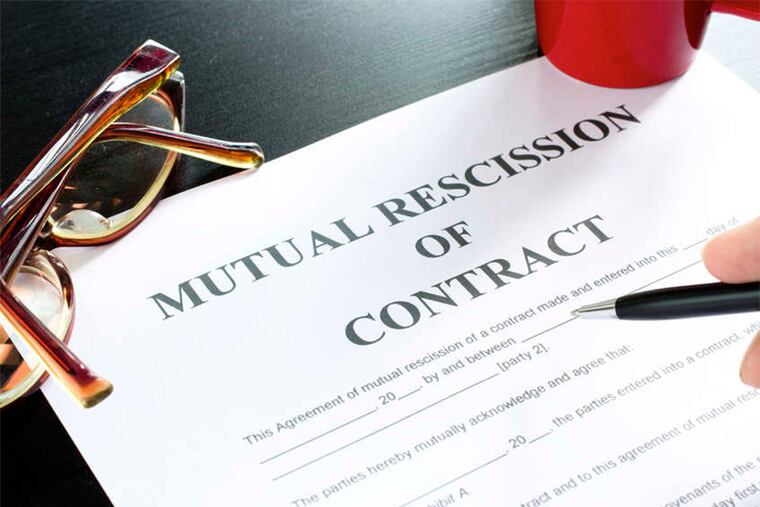Consumers rarely use the right to cancel a contract
Sign a contract for goods or services, and you've got at least three days to back out, right?

Sign a contract for goods or services, and you've got at least three days to back out, right?
Wrong, as readers of this month's Inquirer report on Sundance Vacations should know. The Wilkes-Barre business sells lodging packages under contracts that say they are "not subject to any 'right of rescission' and may not be canceled." Although some Wisconsin lawyers disagree, saying their state's timeshare law provides a seven-day escape clause, Sundance has escaped legal challenge in Pennsylvania.
But what happens when consumers do have an indisputable right to cancel - say, under one of the handful of federal or state laws that guarantee it in certain circumstances, such as for some home-improvement contracts or gym memberships?
Surprisingly little, according to a study by Jeff Sovern scheduled for publication in the University of Pittsburgh Law Review.
Sovern, who teaches consumer law and civil procedure at New York's St. John's University Law School, analyzed survey responses from 155 businesses that informed consumers of their right to cancel a deal. It rarely seemed to matter.
More than two-thirds said customers either never or almost never canceled. Only five reported losing more than 10 percent of their customers to rescinded contracts.
Sovern did find one factor that seemed to boost the rate of cancellations: Companies that provided both written and oral disclosures were more than twice as likely to see cancellations as those that provided only written disclosures. But even then, cancellations remained rare.
He is reluctant to draw conclusions beyond the obvious: that rescission rights, such as the Federal Trade Commission's three-day Cooling-Off Rule, seem to be rarely invoked. "I've been teaching these laws for more than a quarter-century, and I've been wondering if they actually helped anybody," he told me last week.
One limitation, Sovern says, is that consumers don't realize they want out until it's too late. That was true of many of Sundance's consumer critics, who said they sought to cancel only after finding it difficult or impossible to get accommodations they wanted, or after facing extra fees they didn't expect, even if they were disclosed in the contract.
"If the company can keep a consumer from finding out there's a problem before the right expires, then the right of rescission does very little good," Sovern says.
Another issue is the changing nature of the hard sell. The FTC rule aimed at some of its most notorious forms (think of the door-to-door aluminum-siding salesmen in 1987's Tin Men), which have largely vanished. Today's hard sell more likely starts on the phone. Some states, like Pennsylvania, have broadened their laws, but there's no federal rule.
So what does work? Sovern says his study supports other evidence that disclosure alone has little value in consumer protection. He says it is more effective when government directly prohibits bad practices, such as the bar against hounding debtors round the clock in the Fair Debt Collection Practices Act, or the requirement to investigate errors under the Fair Credit Reporting Act.
Sovern also sees value in broader prohibitions against unfair, deceptive, or abusive practices - the kinds found in state consumer-protection laws and, more recently, in 2010's Dodd-Frank law, which gave the new Consumer Financial Protection Bureau wide authority to identify and limit financial practices that hurt consumers.
The trick to those kinds of protections, of course, is that they require government officials to step up to the plate - to identify damaging practices and go after them. At the state level, that typically depends on aggressive enforcement by an attorney general who makes consumer protection a priority - a rarity in Pennsylvania and many states.
There's nothing simple to the process. It took the Federal Reserve Board and Congress more than a decade to wake up to complaints about credit-card issuers who lent money at teaser rates and then used any reason - or no reason at all - to raise them. If that was unfair and deceptive in 2009, it was unfair and deceptive from the start.
But belated protection is better than none at all.